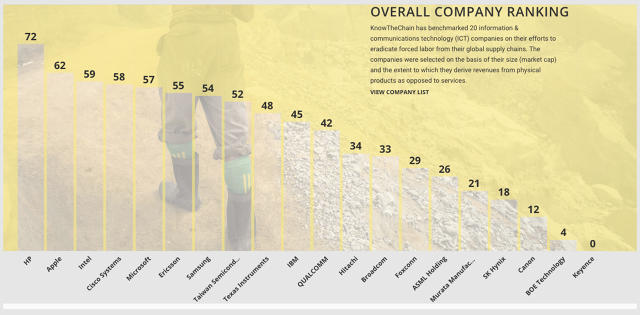It’s not easy for tech companies to avoid labor abuse in their supply chains. Modern products are made up of hundreds of components and raw materials, each with their own chains of subcontractors and middlemen. Just drawing an organizational chart for a cellphone is hard enough. Ensuring nobody was coerced or abused in the manufacturing process is harder still.
That said, some companies do a better job than others, a new report shows. They’re aware of the potential for abuse. They understand the particular ways workers are mistreated and try to limit the opportunities. And, they follow what the rest of the industry is doing and copy what works.

The report, which comes from KnowTheChain, a nonprofit coalition, ranks 20 companies across seven themes, from their recruitment policies to their purchasing practices. It finds a big divergence. At the top are companies like HP and Apple which get marks of 72 and 62 out of 100. At the bottom are Japanese companies, like Canon and Keyence, which respectively get 12 and precisely zero points.
Kilian Moote, KnowTheChain’s project director, says bonded labor most commonly occurs when migrant workers pay fees to recruitment agencies. Their wages then don’t cover what they owe and they become beholden to their jobs (their recruiters may also take their passports). In Malaysia’s electronics sector, for example, it’s estimated that almost a third of migrant workers are in situations of forced labor.
HP has a policy on recruitment that separates it from other companies, Moote says. It tells contractors to hire workers directly, rather than using intermediaries who present higher risks. Apple and Cisco, which come second and third in the list, both look to reimburse recruitment fees. Apple says its paid $25.6 million to workers since 2008, including $4.7 million last year alone.
Moote says the industry has made some progress to clean up its act in the last decade. But the overall level of performance is still low. The average score among the 20 companies is only 39 out of 100, with the average for the recruitment theme only 19 points. “Eighteen of the 20 have some kind of awareness of these issues, but what we need to see more of is the implementation process. That’s where the big gap is,” Moote says.
Have something to say about this article? You can email us and let us know. If it’s interesting and thoughtful, we may publish your response.
related video: How To Lead A Purposeful Company Toward Social Change
Fast Company , Read Full Story
(40)